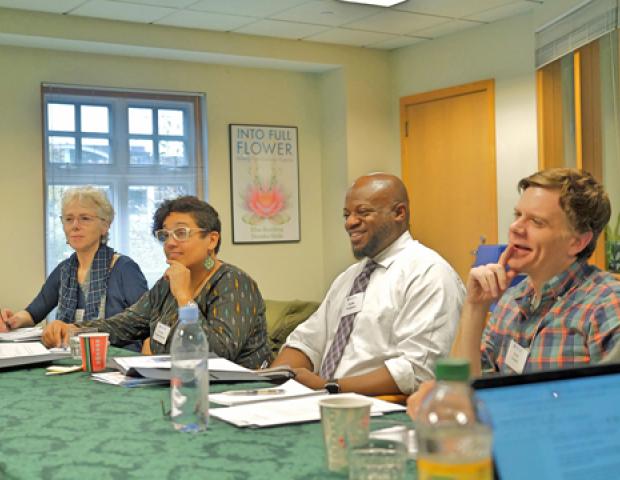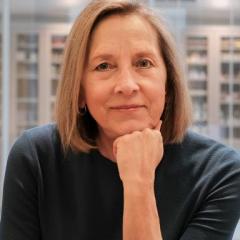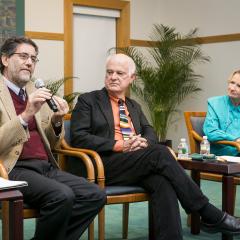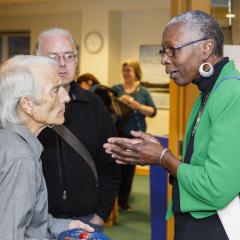Can Dignity Be Realized in Circumstances of Displacement?
In 2018, the Center brought together the scholars Zeena Zakharia and Patricia Krueger-Henney of UMass-Boston and Jason Goulah of DePaul University to explore the meanings of dignity in circumstances of displacement, inclusively understood. They were joined by five of their doctoral students for a dialogue that urged us all to resist “othering” when considering what it means for individuals and communities to experience genuine dignity.
Few issues today incite greater political factionalism within developed nations than the matter of refugees seeking safety within these relatively more peaceful places. For the most part, debates center on the challenges—or in the view of many, the problems—that refugees present to the receiving country. Without denying that refugees do indeed present a range of challenges, it is fair to be concerned that there is so little discussion of the actual plight of the refugees and the dire circumstances of displacement in which they find themselves. The Ikeda Center’s November 2, 2018, in-house seminar for established and emerging scholars sought to open an informed and compassionate conversation on how to mitigate the suffering of refugees and other displaced people.
Called “Reinvigorating Dignity in Displacement: A Dialogue Across Educational Communities,” the conversation employed an inclusive understanding of displacement to consider not just refugees, but also those displaced “in more complex and multivalent ways—e.g., psycho-spiritual, cultural, linguistic, onto-epistemological, and in the sense of the processes that ‘otherize’ people, even in their own homes, schools, and communities.” The topic was chosen to reflect significant themes in the work of professors Patricia Krueger-Henney and Zeena Zakharia of UMass-Boston and Jason Goulah of DePaul University, all of whom were in attendance, along with five doctoral students from their respective programs.
For grounding, seminar participants considered two “touchstones.” The first was from the organization Dignity in Schools: “We advocate for the human rights of all young people to a quality education, to be treated with dignity, to be free from discrimination and to participate in decision-making that affects their education.” The second drew from Daisaku Ikeda’s 2013 and 2017 peace proposals. These read, in part:
For those who have been driven from their homes by conflict and are living in an unfamiliar environment, meaningful work and education are means to recover a sense of human dignity, gaining hope for the future and a purpose in life…. In the final analysis, resolution of the refugee crisis hinges on our ability to enable forcibly dislocated persons to regain a sense of security, hope and dignity. (2013)
The inherent dignity of life does not manifest in isolation. Rather, it is through our active engagement with others that their unique and irreplaceable nature becomes evident. At the same time, the determination to protect that dignity against all incursions adorns and brings forth the luster of our own lives. (2017)
With these touchstones in mind, participants explored three questions: What is dignity? What does dignity demand from us, particularly in instances of displacement? And how do these and other related questions inform our convergent and divergent work conceptually, practically, empirically, and in publication?
What is Dignity?
Before delving into the main discussion, the participants, all of whom are education scholars, introduced themselves and their research interests, with a special focus on those dimensions dealing with persons experiencing some mode of displacement. Focuses for the established scholars include: Krueger-Henney’s work on the social inequalities young people experience and perceive in the physical spaces of public education; Zakharia’s concern for the interplay of language, conflict, and peacebuilding in education, especially in war-affected contexts; and Goulah’s experience with bilingual-bicultural education and as director of the Institute for Daisaku Ikeda Studies in Education at DePaul. After the introductions, Dr. Goulah, who is also executive advisor to the Ikeda Center, asked everyone to discuss what we mean by dignity.
First to weigh in was Nozomi Inukai, a doctoral candidate at DePaul University whose research interests span from bilingual/dual language instruction to explorations of “good teaching” from a Soka, or value creating, perspective. She observed that it’s often easiest to identity the negatives, those things that constitute the absence of dignity. As a way to think more concretely about the attributes of dignity, she referenced Martha Nussbaum’s list of ten capabilities that all people should be free and able to pursue. These include qualities such as being able to live a life of normal length; to possess bodily integrity, free from violent and sexual assault; and being able to laugh and play. By inference these constitute the possession of dignity.
Professor Zakharia wondered if perhaps dignity might be best defined in a spiritual sense, something like the Quakers’ notion of the spark of God inherent in each of us, something pointing toward the sacred, interconnected nature of all life, understood in a non-religious sense. For a more concrete expression she recommended looking at the UN Declaration of Human Rights, which presents “good, aspirational material.” Professor Krueger-Henney referenced the work of the Afro-Caribbean historian and feminist, Sylvia Wynter, noting that questions of dignity require us to ask what it means to be human, but cautioning that the language we use to do so can be conditioned by the historical forces that gave rise to that language. Are we using the language and narratives of colonialism? What do we need to “unsettle,” she asked, to get closer to the truth of what dignity means for all of us now? A big part of our challenge, she suggested, is to stop seeing the other in terms of deficits.
Ritsuko Rita, a doctoral student at DePaul whose research interests include EFL instruction and curriculum studies in value-creating education, began by citing Mr. Ikeda’s Buddhist perspective. She drew special attention to his 2013 peace proposal, in which he recommended that we “vow to defend and celebrate diversity.” In her view, a vow can be meaningful for motivating people to work collectively to realize the daunting goal of creating a world in which the dignity of all is respected and nurtured. She also mentioned her appreciation for Ikeda’s focus on the interconnectedness of life, which means that any displacement of persons is an assault on the dignity of each one of us. Further, the individual and collective dignity we forge in the present is conditioned through our interconnections with the past and future. Dr. Goulah built on this latter insight, noting how the work of Bryan Stevenson and the Equal Justice Initiative to create the National Memorial for Peace and Justice intends to affirm and restore a measure of dignity for the victims of racial terror lynchings, not only by acknowledging their names and the injustice they suffered but also by encouraging a greater commitment to justice going forward. Dr. Zakharia said that this might be called the temporal dimension of dignity.
The Relational Nature of Dignity
Building on these opening ideas, as well as Mr. Ikeda’s conviction, offered in his 2013 peace proposal, that the “inherent dignity of life does not manifest in isolation,” Goulah asked: Is dignity relational? In response, Diallo Ferguson gathered some threads from previous comments to portray a few ways that dignity is impacted by relationships. A doctoral student at UMass Boston researching issues relating to English as a Second Language, education and globalization, and the school-to-prison pipeline, he noted that the ability to realize the positive attributes of dignity, such as those outlined by Nussbaum, is “reflective of your environment and how you are viewed in that context.” He also posed some questions: From whose perspective do we determine dignity? Is it inherent? Or is it given? What has happened historically to impact present dignity?
Nina Kunimoto is also at UMass, a doctoral student in its Urban Education, Leadership, and Policy Studies program. Her wide experience includes doing educational work with refugees from Myanmar on the Thai-Myanmar border. For her, the essence of relational dignity is exemplified by restorative justice practices. These try to rectify the manifold dignity violations of our flawed incarceration regime in the US, as well as offer more creative ways for communities to address conflicts. In restorative justice, even the perpetrators are seen as being part of the web of social relations, and the goal is the restoration of full humanity for everyone.
Picking up on Ferguson’s question on the sources of dignity and the core restorative justice insight that all parties are harmed in retributive systems, Center Program Director Kevin Maher cited an important observation Desmond Tutu makes about Nelson Mandela’s experience as a prisoner.* Almost immediately upon incarceration Mandela saw that the main objective of the guards and the prison itself was to rob the prisoners of their dignity. At that moment he determined to not let that happen, certain that his dignity was his own to nurture and control, something he would “not part with … at any price or under any pressure.” Krueger-Henney remarked that it is ironic that those who rob others of dignity don’t actually gain dignity themselves. “Should they not then be the most dignified since they have accumulated other people’s dignity?” Center Program Manager Lillian I chimed in noting that in a key passage from Daisaku Ikeda’s 2013 peace proposal, he cited Arnold Toynbee’s assertion that “dignity is irreplaceable,” adding that “a human being also loses his own dignity if he does not respect the dignity of other people.”
Adding another perspective on relational dignity, UMass Boston doctoral candidate Chris Hall shared some lessons from his work with students with autism and other severe disabilities. Quite simply, said Hall, each time his students get compared to others, they lose dignity, since the comparisons inevitably hinge on what is and is not considered normal. Dignity thrives through the acceptance of differences, and in the confidence to be different. Above all, dignity manifests in “finding a way to listen to their voice.” Hall’s remarks reminded Nozomi Inukai of a parable-like thought experiment that inspired her when she taught elementary school. It asked: What if the only measure for an animal’s worth was their ability to climb a tree? Suddenly only the animals with that ability are considered worthy, while the countless animals lacking it are considered less so. Unfortunately, comparisons among students and among teachers, especially based on quantifiable metrics, are the central reality in schools today. Chris Hall remarked that this misses so much that is important in teaching, including the happiness of students. He said he was inspired in this regard by Mr. Ikeda’s vision of compassion as one in which we stick with those that suffer, encouraging them until, as Mr. Ikeda described it, “the smiles return to their faces.”
The emphasis on comparison is a reflection of our society’s fundamentally competitive nature and structure, said Nina Kunimoto. Diallo Ferguson agreed that this is a “pervasive” issue, one extremely difficult to change. A big factor in keeping the status quo in place, he said, is that once people achieve a certain degree of status or power in our competitive system, they are typically unwilling to relinquish any of it. How, he wondered, do “we get around that?”
This phase of the conversation concluded with two vignettes illustrating relational dignity. Professor Zakharia shared her memory of a woman she worked with years ago in Lebanon who, despite never having left the country herself, was the most welcoming person of all to displaced people of every kind entering her town. Zakharia posed some unanswered questions. Where did this quality come from? Why did this provincial woman manifest concern for the inherent dignity of outsiders? And, crucially, how can schools promote the spirit of interconnection she embodied? Professor Goulah commented that perhaps the key thing teachers can do is to do what the Lebanese woman did, which is to model that welcoming behavior, and thus inspire others to want to be that way.
The Center’s Events and Publications Coordinator Anri Tanabe followed with a recollection from her Peace Corps experience in a village in the southern African country of Lesotho. One of the villagers was a man who clearly suffered from cognitive limitations. Yet he was accepted without ridicule or even condescension by everyone in the village. A sense of “shared community,” she said, made the assumption of dignity the norm. “That’s somebody’s son,” observed Zakharia.
To promote this kind of culture in schools, said Ferguson, the first thing one can do is to gauge the cultural competencies of the building. Listen for the little utterances that betray a lack of consideration or desire to acknowledge the dignity of others. These are seldom meant maliciously, and present a good place to start a conversation.
Does Dignity Demand Something of Us?
The penultimate discussion revolved around the idea that dignity makes demands on us, that passivity is inadequate in the face of the indignities that accrue from displacement and other hardships. What is the “vow” for dignity that we would make? asked Dr. Goulah. How can the nurturing of dignity become a continuous action for us? The main idea that emerged was that as a starting point we need to find a way to be fully present for everyone, even when they strike us as “the other,” different in ways that we find hard to understand or that make us quite uncomfortable. The discussion revealed a number of dimensions of this challenge.
A question from Professor Krueger-Henney put it this way: Can we, or even should we, love those we have been taught not to? Kunimoto referenced Gandhi’s movement and their commitment to nonviolence. Could their refusal to meet violence with violence during acts of civil disobedience be based on a refusal to de-humanize even those who are actively harming them? This sounds like the challenge of “radical love,” added Ms. Inukai, the kind of care for the other that goes beyond our feelings of liking or disliking certain people and what they might stand for.
The first step for getting to this place is to develop strong self-awareness, to understand one’s own biases and triggers. To achieve this, said Dr. Goulah, “I need to be honest with myself and have a sincere intention to grow” by engaging with people and things that “don’t sit well with me.” This process of inner growth and transformation is what Daisaku Ikeda calls “human revolution.” Dr. Zakharia described the challenge as one of empathy, that is, “to come as close as possible to seeing through others’ eyes.”
The other main dimension of honoring the dignity of the other and the displaced is to consider how structural factors, especially in our school systems, impinge on our ability to actualize the widespread flowering of dignity. A number of questions were raised in this regard. Krueger-Henney wondered if dignity violations or deficits in dignity are a factor in so many high school students leaving school. Instead of “drop outs” might some be called “pushed outs”? A number of participants talked about the culture of competition, alluded to earlier, that dominates our schools, as well as society as a whole. Not only are students ranked against one another, but schools and teachers are also ranked on the basis of their students’ scores. In other words, our schools too often reflect what Zakharia called “the anti-social structures” of our society, including an emphasis on “zero sum” interactions. As an example of the latter, Diallo Ferguson observed that in our capitalist, market economy people often get rich by displacing others. How can we challenge that?
Though these structural factors pose limitations to the general cause of dignity, opportunities to nurture dignity, including with those in situations of displacement, are always in front of us. Everyone agreed that Chris Hall’s description of his work with autistic students represented well what all educators should aspire to. The challenge with his students, explained Hall, is that while it is vital that they—each in his or her own unique way—feel themselves to be in a safe place, the goal is to help them leave that place, that is, to move outward into more inclusive social environments. The teacher’s first step, then, is to meet each student “in their space,” an act that requires humility on the teacher’s part. The key, however, is to not just stay there with them. The truest, most meaningful act, Hall stated, is “to go somewhere together.”
Breaking Through the Silence
The questions, feelings, and ideas expressed by participants on dignity and displacement were largely formative, but this is not surprising. The topic is one that has been studiously ignored in the larger narrative of the American project of 2018, and so the first order of business is to define the conversations we need to have. As the seminar wrapped up, the participating scholars talked about which of the ideas on dignity and displacement they most want to bring into their research and practice, as well as thoughts on organizing key ideas into a statement on dignity and displacement they might share with their fellow educators.
Ultimately, no definitive answers to the questions raised during the seminar emerged. But a quote shared by Ritsuko Rita near the end did capture the message and spirit of the day. In the quote, the thirteenth century Japanese Buddhist priest Nichiren, whose writings significantly inform the work of Daisaku Ikeda, said this: “If you care anything about your personal security, you should first of all pray for order and tranquillity throughout the four quarters of the land, should you not?” As each participant made clear, more of us need to grasp that order and tranquility will not fully manifest until the displaced among us find their way home: physically, intellectually, emotionally, spiritually.
* For more on this story see Donna Hicks, Leading with Dignity (New Haven: Yale University Press, 2018), p. 4.



